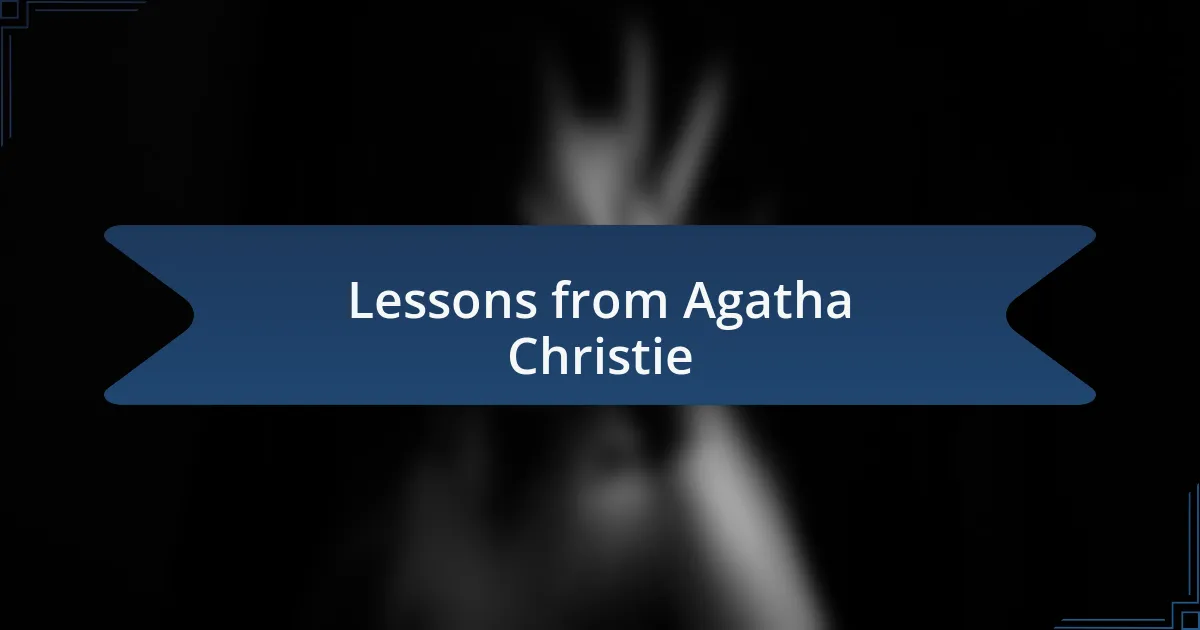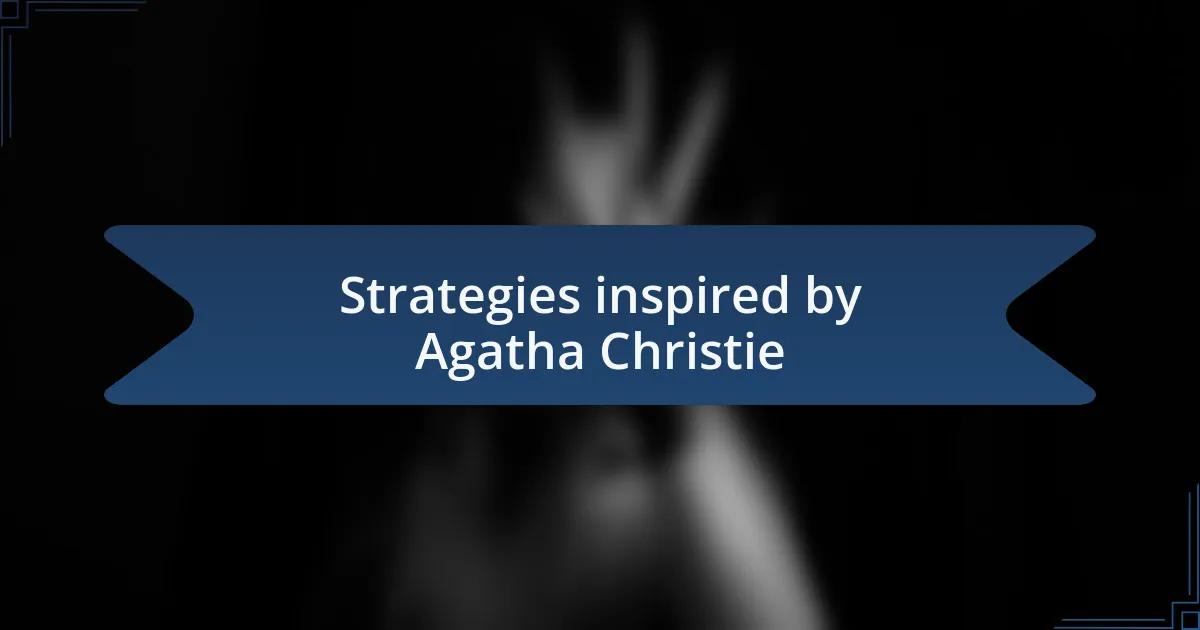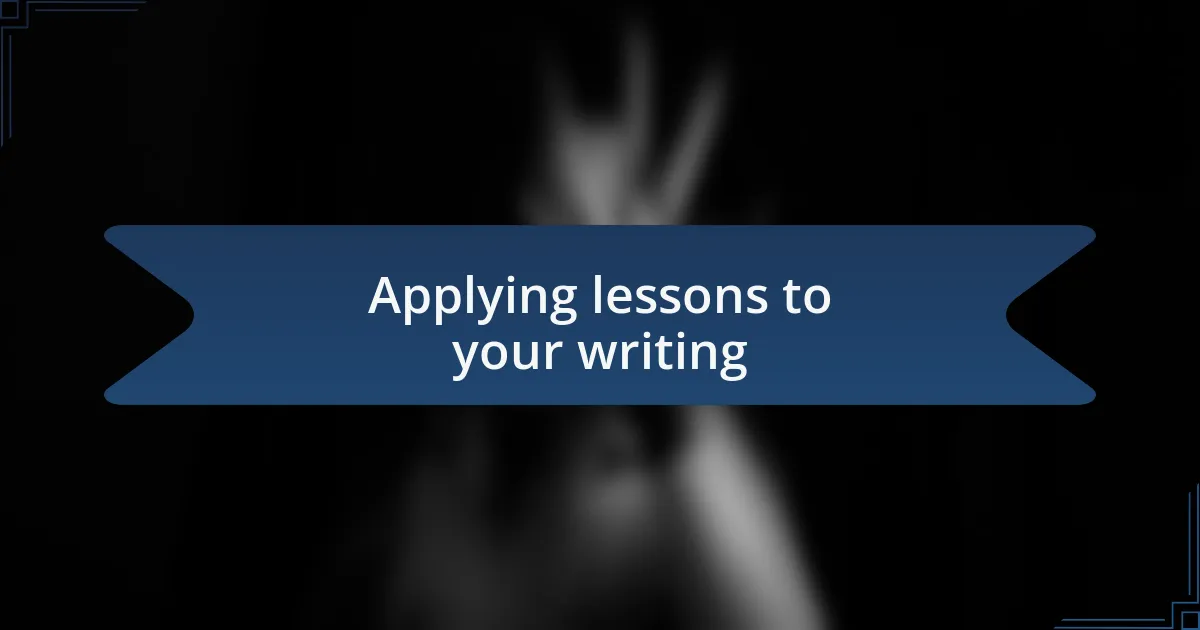Key takeaways:
- Writer’s block is often an emotional struggle rooted in fear of inadequacy and perfectionism, impacting even established authors.
- Overcoming writer’s block enhances creativity, resilience, and personal voice, leading to transformative writing experiences.
- Effective techniques include changing environments, setting timers for short writing bursts, and journaling to release thoughts and inspire new ideas.
- Lessons from Agatha Christie emphasize persistence, character development, and the importance of routine in overcoming creative challenges.
Understanding writer’s block
Writer’s block can feel like an insurmountable wall, can’t it? It’s that frustrating sensation of sitting before a blank page, your mind racing yet utterly devoid of words. Personally, I’ve experienced this when I felt an immense pressure to emulate Agatha Christie’s clever plot twists. I wondered, was I putting my own creativity in a cage by trying too hard to match her genius?
Often, it stems from an internal struggle. I recall a time when I found myself comparing my unfinished work to Christie’s masterpieces, and rather than motivating me, it paralyzed my creativity. Have you ever felt that overwhelming comparison? It’s important to recognize that this block isn’t just a physical barrier; it’s emotional—rooted in fear of inadequacy or perfectionism.
Understanding writer’s block means recognizing that it affects us all, even the most celebrated authors. The challenge lies in how we choose to confront it. I remember a pivotal moment when I shifted my mindset, allowing myself to write poorly—just to write. This shift not only alleviated my anxiety but also opened the floodgates to ideas that I didn’t know existed. What might happen if you allowed yourself the same freedom?
Importance of overcoming writer’s block
Overcoming writer’s block is crucial for nurturing and maintaining our creativity. I vividly remember a time when I felt like I was drowning in my thoughts, unable to express them on paper. It wasn’t just about writing; it felt like a part of my identity was on hold. When I finally pushed through that barrier, I rediscovered my voice, which ignited an excitement in my writing journey that I hadn’t felt in ages.
Moreover, tackling writer’s block allows us to develop resilience. Each time I found a way to write through the struggle, I felt more equipped to handle future obstacles. Isn’t it fascinating how each small win builds our confidence? Through these experiences, I learned that overcoming these blocks isn’t just a task; it’s a transformational journey that empowers us as writers.
Additionally, beating writer’s block can unlock new paths in our creativity. There were moments when shifting my focus from perfection to exploration led me to unexpected and rewarding ideas. Have you ever stumbled upon a plot twist or character inspiration just when you least expected it? By freeing ourselves from the chains of self-doubt, we not only enrich our own writing but also honor our favorite authors, like Christie, by allowing inspiration to flow without limitation.
Techniques to break writer’s block
One effective technique that has worked wonders for me is changing my environment. I remember the time I sat stuck in my cluttered home office, feeling the weight of my unwritten words. Just a short walk to a nearby café transformed my mindset. Surrounded by the hum of conversation and the aroma of fresh coffee, I felt inspired again, ready to tackle that blank page. Have you ever tried writing in a different setting? Sometimes, all it takes is a fresh perspective to rekindle your creativity.
Another strategy that I’ve found helpful is setting a timer for short bursts of writing. During one particularly tough week, I committed to writing for just ten minutes a day without any judgment. It was surprising how quickly my thoughts flowed when I eliminated the pressure of perfection. This approach keeps the writing process manageable and fun. Will you give it a shot? You might find that what started as a daunting task becomes an enjoyable routine.
Lastly, I often turn to journaling when writer’s block strikes. I pour out my thoughts and feelings onto the page, often leading to unexpected insights about my writing struggles. One day, while journaling about my frustrations, I discovered a theme I wanted to explore in my next story. It’s like unlocking a door to my subconscious—how cathartic it feels! Have you ever tried this? You may uncover ideas that inspire you in ways you hadn’t anticipated.
Personal experience with writer’s block
There was a time when I felt like every word I tried to write simply crumbled in my mind. I distinctly remember staring at my screen for hours, completely drained of inspiration. It felt like I was standing in front of a brick wall, and the harder I pushed, the thicker the wall seemed to become. Have you ever found yourself in that suffocating silence? It’s frustrating, but I’ve learned that embracing those moments of stillness can lead to unexpected clarity.
One day, during a particular bout of writer’s block, I decided to shift gears completely. Instead of forcing myself to write, I picked up my old sketchbook and began doodling. The act of creating in a different medium loosened my thoughts. Before I knew it, ideas for my story sprang to life, and I felt that familiar surge of excitement. Isn’t it fascinating how creativity can be reignited through other forms of expression?
In another instance, I was caught in a cycle of comparing myself to other writers, which only added to my anxiety. I remember browsing through social media and seeing the stunning work my peers created, which led me to doubt my own abilities. I took a step back to reflect—why was I letting others dictate my progress? That realization was liberating. Sometimes, the toughest critic we face is ourselves. Breaking free from that mindset has been vital in overcoming my writer’s block. Have you faced similar challenges? Understanding that each writer’s journey is unique can be remarkably freeing.

Lessons from Agatha Christie
Agatha Christie’s ability to create intricate plots reveals a crucial lesson: persistence is key. I once found myself entrapped in the details of my own story, much like Christie meticulously crafted her characters. During that frustrating period, I recalled how she would often revisit her outlines and tweak the tiniest elements, ensuring everything worked harmoniously. This taught me that stepping back and reassessing your work can spark new inspiration and clarity. Have you tried looking at your project from a different perspective?
Another aspect of Christie’s approach that resonated with me is her deep understanding of human nature. She often drew on her own experiences and observations to flesh out her characters, which made them relatable and authentic. I remember a time when I struggled to find the right voice for my protagonist. Reflecting on my own emotions and experiences helped me connect with my character, turning them into a compelling figure rather than just words on a page. Isn’t it interesting how our personal stories can breathe life into our writing?
Lastly, Christie’s disciplined writing routine is a noteworthy takeaway. Despite facing her own challenges, she maintained a steadfast daily writing habit. I realized how beneficial it could be to set aside dedicated time for writing, regardless of the inspiration levels. There were days I sat down with little more than a few lines, yet this commitment carved a path through my creative block. How might establishing your own routine transform your writing journey?

Strategies inspired by Agatha Christie
One strategy that I believe Christie exemplified brilliantly is the power of setting a scene. When I felt stuck, I often thought back to how Christie vividly painted her locations, drawing readers deeply into the atmosphere. I once decided to write an entire scene inspired by a favorite place of mine—an old café filled with eclectic decor. The act of visualizing that environment not only freed my mind but also opened the floodgates of creativity. Have you ever found that a change of scenery can shift your perspective on a project?
Another innovative approach I gleaned from Christie is the importance of plotting twists and surprises. I remember when I was wrestling with how to steer my story forward. Inspired by her adept use of unexpected plot turns, I introduced a twist that I hadn’t originally planned. The surprise not only reinvigorated my narrative but also reignited my excitement for writing. Isn’t it fascinating how a simple twist can rejuvenate an entire narrative?
Finally, I can’t underestimate the value of collaboration, which Christie embraced in her later works. When I started sharing drafts with a trusted friend, their insights were nothing short of illuminating. I found that discussing my ideas aloud and receiving feedback reshaped my writing in ways I hadn’t imagined. How might sharing your creative struggles create new pathways for your own story?

Applying lessons to your writing
One of the most profound lessons I’ve applied to my writing is the importance of character development. When I struggled with a chapter, I revisited my characters’ backstories, seeking to understand their motivations on a deeper level. I found that crafting a detailed character profile not only brought clarity to my narrative but also breathed life into my storytelling. Have you ever considered how your characters’ histories shape their decisions in your writing?
Another technique that helped me was the practice of writing prompts. Sometimes, I would feel trapped in a particular mindset, so I turned to prompts inspired by Christie’s intricate plots. One day, I picked a phrase like “a missing heirloom” and wrote a short scene around it. That quick exercise shook off my mental cobwebs and sparked ideas I hadn’t anticipated. Could a simple prompt be the key to unlocking your creativity?
Lastly, I have learned the art of patience. During moments of frustration, I often reminded myself of Christie’s relentless revisions; her dedication to perfecting her work became a source of inspiration for me. When I felt like giving up, I made a habit of stepping away from my writing, allowing ideas to simmer. This practice taught me that sometimes, taking a break is the most effective way to overcome a creative block. Don’t you find that stepping back can often lead to unexpected insights?